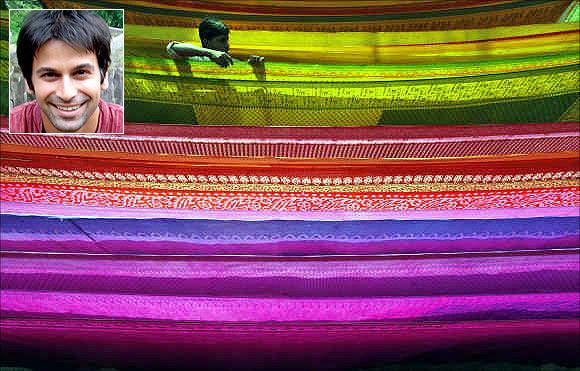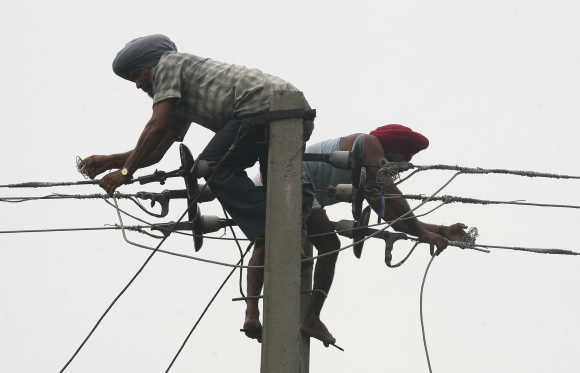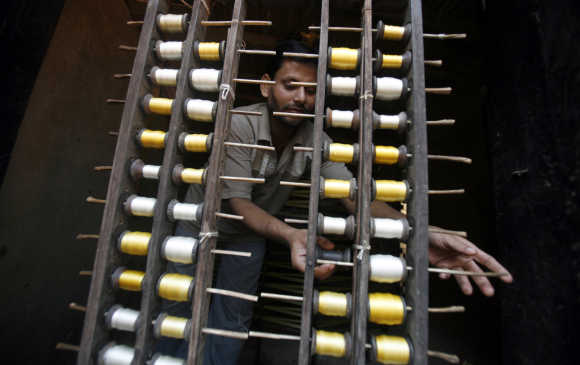Photographs: Rupak De Chowdhuri/Reuters Faisal Kidwai in Mumbai
Corrupt officials are killing rural employment programme, Mahatma Gandhi National Rural Employment Guarantee Act, by overbilling and underpayment, says Sandip Sukhtankar, Assistant Professor, Department of Economics, Dartmouth College, who has conducted extensive research on the multi-billion scheme.
Sukhtankar, an affiliate of the Jameel Poverty Action Lab and a Giorgio Ruffalo Research Fellow at the Harvard Kennedy School, says monitoring will only work if those found out to be corrupt are punished.
We need real laws to protect whistle-blowers, and even more than that real action should be taken against perpetrators, he tells Faisal Kidwai in an emailed interview.
Here are the excerpts:
Could you give us an idea how big NREGA is in the Indian context and compared to other programmes around the world?
NREGA is most certainly a massive programme. In the Indian context, it is the largest public programme along with the Targeted Public Distribution System. In 2010-2011, the central government allocated Rs 401 billion or 3.6 per cent of government spending to the programme.
This puts it on par with other large developing country social programmes such as Oportunidades (formerly Progresa) in Mexico, or the Bolsa Familiar in Brazil. It is the largest 'workfare' programme in the world, dwarfing comparable programmes in Argentina or even the Earned Income Tax Credit Scheme in the US in terms of the number of people it reaches.
...
'Strict action needed to stop corruption in NREGA'
Image: A labourer works in a brick factory at Togga village, in the outskirts of Chandigarh.Photographs: Ajay Verma/Reuters
How does corruption occur in the programme?
The basic idea is very straightforward, and involves overbilling. Suppose a labourer - let's call her Rita - works on NREGA for five days, the official Shyam reports to the government that she has worked for 10 days and keeps the difference in wages. He may also make up fake or ghost 'Ritas' and say they have worked while pocketing the wages that accrue to them.
It's also quite likely that overbilling for materials occurs in a similar fashion - the government is charged for 20 bags of cement when only 10 were used. But overbilling for materials is a bit harder to document (cement doesn't talk) and also perhaps less of a monetary problem in this case since materials make up a smaller portion of the budget.
Perhaps an even more pernicious form of corruption in NREGA occurs through underpayment, since this directly takes money away from the poor. Suppose the wage to be paid to labourers is Rs 100, the official only pays them Rs 80 and again keeps the difference. This kind of corruption is more likely to take place where workers are powerless and officials are exploitative.
...
'Strict action needed to stop corruption in NREGA'
Image: Workers repair high voltage power lines at Fatehpur Sylwa in Punjab.Photographs: Ajay Verma/Reuters
There are well-documented instances of whistle-blowers being beaten up and even killed. In such a situation, who is going to speak out against corruption?
This is an excellent question, and a key problem that the country needs to resolve. First of all let me emphasize that this is not a problem unique to NREGA: whistle-blowers have been attacked everywhere and for pointing out corruption in all sorts of programmes, from the kerosene mafia in Maharashtra to road construction in Bihar.
In the NREGA instance, people were initially very excited about social audits that helped villagers expose officials. But when the accused stonewall and delay judicial proceedings and then end up back at their old jobs, it destroys local people's confidence that speaking up will achieve something. The local villagers are the ones who are left to face the consequences - and the perpetrators they spoke against - once the auditors leave. So now the level of bravery that is required to speak out has gone up, since only the very brave or foolhardy will raise their voices against corruption.
We need real laws to protect whistle-blowers, and even more than that real action to be taken against perpetrators: not just have the corrupt return money and be suspended for a while. Of course this is far easier said than done given the slow speed of judicial reform in the country.
...
'Strict action needed to stop corruption in NREGA'
Image: A weaver changes a spool of silk yarn for making fabrics in Margram village, about 240km north of Kolkata.Photographs: Parth Sanyal/Reuters
You have said it is possible to reduce corruption and make the achievement of the goals cost effective. What steps are needed to achieve this? And, what measures are needed to make this programme efficient?
I have noted that technological solutions - such as using Aadhar to pay workers directly - have the potential to reduce corruption and make this programme more efficient.
However it is by no means certain that these solutions will work. If officials now find that they are no longer making money off the programme, they might have no incentive to actually implement NREGA. The poor may have difficulty enrolling in Aadhar and hence might be denied employment, which would be a terrible outcome since these might be the most vulnerable sections of society. So we need carefully designed pilots in order to verify that the technological solutions actually work.
Other possibilities are judicious use of monitoring technology: digital cameras are cheap and now even found on many mobile phones. In our field visits we met some clever district and block level officials who were using these to verify reports of work. But again monitoring will only work if those found out to be corrupt can be punished. And once again this is not a NREGA issue, but a much broader problem.





article